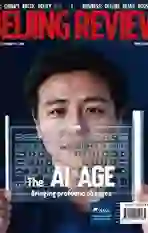AI: Opportunities and Challenges
2018-03-06
Imagine driverless cars running on highways and smart robots cooking food in the kitchen, cleaning apartments, and yes, even communicating with people. Once a scenario imagined only in science fiction, this has, incredibly, become a reality today thanks to the remarkable progress in the development of artifi cial intelligence (AI), which is a core part of the emerging Fourth Industrial Revolution. AI is profoundly impacting many aspects of human lives, from lifestyles to economic development.
With the new opportunities brought by AI, it has become the focus of market attention in the form of either development or investment. Technological progress has made it possible for AI to develop in diverse ways, from chips and the Internet itself to big data and cloud computing.
Chinas AI development is among the best in the world. The Chinese Governments new-generation AI development strategy aims to take the industry to a new high. Thanks to huge demand and strong fi nancial support, AI is being widely applied in production activities across China.
At present, AI technologies have been applied to the manufacture of driverless vehicles, in retail and in the fi nancial sector. Robots and other AI-based equipment are being used in the medical sector and for household stewardship. Besides, the manufacturing sector is using industrial robots and machine vision, which constitute 80 percent of the entire AI market. The China Center for Information Industry Development predicts that Chinas AI market will exceed 40.6 billion yuan ($6.46 billion) in 2018.
The expanding market of AI applications and rising investment in this area refl ect society and the markets recognition of AI and their confi dence in it. One objective behind the development of AI is to maximize mankinds freedom. If all work is done by robots, human beings will be relieved of manual labor and in some cases, mental work.
But while AI has brought new developments and more freedom for humanity, this product of technological progress is also posing new challenges, which society must confront.
AI is intended to promote the upgrading of traditional industries, and at the same time, act as a new driver of technological revolution and industrial transformation. In the future, it will play a much bigger role in automation control. As AI progresses, robots are going to replace human beings in many areas.
But is human society ready for that to happen? At a time when wealth is still distributed based on labor contribution and given the ethical and moral principles human society follows, the possibility of robots replacing human beings in many areas due to the widespread use of AI must be carefully considered.endprint
